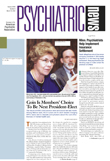APA is making a change to two membership categories that should result in more members being able to become APA fellows earlier in their careers while preserving the prestige and respect of the designation of fellow.
These categories are APA fellow and distinguished fellow. The changes go into effect on January 1, 2003.
All current fellows will be grandfathered into the distinguished fellow category on January 1, 2003. The existing category of distinguished fellow, which is reserved primarily for nonpsychiatrists and psychiatrists who are not APA members, is being renamed honorary fellow.
Members who apply and are approved for the redefined category of fellow this year will also become fellows on January 1, 2003.
Creation of the new structure was partly due to the desire of APA’s Membership Committee and Board of Trustees to extend fellowship designations to more and to younger members. The Board gave final approval to the plan at its March 2001 meeting.
“By offering two categories of fellowship,” said Bernard Katz, M.D., chair of APA’s Membership Committee, “APA maintains the honor bestowed upon those members who demonstrate significant achievement in and made valuable contributions to their profession. At the same time, it offers younger psychiatrists a special recognition for their allegiance to their profession and encourages them to continue their involvement within APA.”
The criteria to become a fellow are five years as a general member; certification by the American Board of Psychiatry and Neurology, Canada’s Royal College of Physicians and Surgeons, or the American Osteopathic Association; three letters of recommendation from current fellows or distinguished fellows, approval by the Membership Committee after a 90-day period in which district branches can comment on the fellowship candidates; and approval by the Board of Trustees.
Candidates for the category of distinguished fellow must meet more comprehensive criteria, including significant achievement in several areas of psychiatry. Candidates seeking the new distinguished fellow status do not need to be APA fellows first.
As part of the new structure, life fellows will be grandfathered into the new category of distinguished life fellows on January 1, 2003.
Those members who are nominated and approved for fellowship and distinguished fellowship by the Membership Committee and the Board this fall will be recognized at the Convocation of Fellows at APA’s 2003 annual meeting in San Francisco.
Complete information on the criteria for all membership categories is posted on the Web at www.psych.org/apa_members/memb_stat.cfm. ▪
